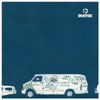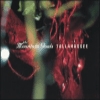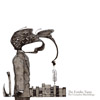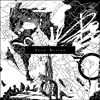- Administrator
- Albums and Singles
 Chicago's Diverse is twenty-five year old MC Kenny Jenkins, who has been making a name for himself through his craft and collaborations with the mighty Mos Def, Prefuse 73 (see Wylin' Out review) as well as Isotope 217 members Matt Lux and Jeff Parker. At one time a mail delivery driver for a local university (that's his van on the cover), Jenkins honed his MC skills and released an EP entitled "Move." This follow-up EP is a taste of what's in store when a full length release materializes later this year. "Certified" is chock full of socially conscious lyrics which flow relaxed and steadily against the dirty funk guitar driven groove, produced by RJD2, which would sound right at home on one of those 70s 'Pulp Fusion' compilations. Jenkins gives a tight vocal delivery on "Build" over K-Kruz's jazzier channeled production which makes use of subtle muted trumpet and gives a nice and chill kinda feel. Both of these tunes also appear as instrumental versions, which highlight elements in backing tracks that would not draw as much attention with vocals over top. Of course, there's also the obligatory radio edi*s, so as not to piss anyone *ff. Based on this EP, Diverse is a name to keep your ear open for.
Chicago's Diverse is twenty-five year old MC Kenny Jenkins, who has been making a name for himself through his craft and collaborations with the mighty Mos Def, Prefuse 73 (see Wylin' Out review) as well as Isotope 217 members Matt Lux and Jeff Parker. At one time a mail delivery driver for a local university (that's his van on the cover), Jenkins honed his MC skills and released an EP entitled "Move." This follow-up EP is a taste of what's in store when a full length release materializes later this year. "Certified" is chock full of socially conscious lyrics which flow relaxed and steadily against the dirty funk guitar driven groove, produced by RJD2, which would sound right at home on one of those 70s 'Pulp Fusion' compilations. Jenkins gives a tight vocal delivery on "Build" over K-Kruz's jazzier channeled production which makes use of subtle muted trumpet and gives a nice and chill kinda feel. Both of these tunes also appear as instrumental versions, which highlight elements in backing tracks that would not draw as much attention with vocals over top. Of course, there's also the obligatory radio edi*s, so as not to piss anyone *ff. Based on this EP, Diverse is a name to keep your ear open for.
Read More
- Administrator
- Albums and Singles
 Don't blame Canada. It just so happens they have some pretty damn fantastic songwriters. Current exhibit Hayden took the music industry by storm with his self-recorded and self-released debut 'Everything I Long For'. The storm was big enough for him to get signed to Geffen imprint Outpost. Woe to those on Outpost, though, after the Unigram merger, as the label was dissolved in the deal. Many of the artists were snatched up by other labels, but Hayden was left in the cold after the mixed-bag sophomore slump of his second CD, 'The Closer I Get'. So he hibernated. And waited. And went back to his roots, recording again in his home with some close friends. The results are this underrated album that was originally planned as a 1000 copy limited addition, but was snatched up by Badman after demand was high. Not a departure by any means, 'Skyscraper National Park' is instead signs of introspective growth as well as hope for this talented songwriter to finally get the attention he deserves. Where previous works have featured Hayden's low growl, this record has him singing quite capably, even touching Kurt Wagner territory on a few songs. The primary modus operandi hasn't changed, though. Slower, melodic folk rock songs with quirky lyrics are the order of the day, with electric guitar used as a squelch tool and noisemaker on such fare as "Dynamite Walls". And Hayden is clearly finding his voice again after almost three years away from recording. He's a little hesitant, and less than perfect vocally on these songs, but it's still refreshing compared to other home-recorded CDs being released these days. My only complaint is it's length - eleven songs at just over thirty-nine minutes is better than most, but after three years I wanted to hear more. All told, though, it's a great indication where Hayden is now, and where this wave might take him. Look for Hayden's recent live album in addition, as word is it's brilliant.
Don't blame Canada. It just so happens they have some pretty damn fantastic songwriters. Current exhibit Hayden took the music industry by storm with his self-recorded and self-released debut 'Everything I Long For'. The storm was big enough for him to get signed to Geffen imprint Outpost. Woe to those on Outpost, though, after the Unigram merger, as the label was dissolved in the deal. Many of the artists were snatched up by other labels, but Hayden was left in the cold after the mixed-bag sophomore slump of his second CD, 'The Closer I Get'. So he hibernated. And waited. And went back to his roots, recording again in his home with some close friends. The results are this underrated album that was originally planned as a 1000 copy limited addition, but was snatched up by Badman after demand was high. Not a departure by any means, 'Skyscraper National Park' is instead signs of introspective growth as well as hope for this talented songwriter to finally get the attention he deserves. Where previous works have featured Hayden's low growl, this record has him singing quite capably, even touching Kurt Wagner territory on a few songs. The primary modus operandi hasn't changed, though. Slower, melodic folk rock songs with quirky lyrics are the order of the day, with electric guitar used as a squelch tool and noisemaker on such fare as "Dynamite Walls". And Hayden is clearly finding his voice again after almost three years away from recording. He's a little hesitant, and less than perfect vocally on these songs, but it's still refreshing compared to other home-recorded CDs being released these days. My only complaint is it's length - eleven songs at just over thirty-nine minutes is better than most, but after three years I wanted to hear more. All told, though, it's a great indication where Hayden is now, and where this wave might take him. Look for Hayden's recent live album in addition, as word is it's brilliant.
samples:
Read More
- Administrator
- Albums and Singles
 When Guided By Voices initially left Matador Records to record with TVT, it was rumored that the main point of contention was Rob Pollard's prolific songwriting, and his inability to concentrate on just one release. Solo records, records under different band names, EPs, and singles dotted the marketplace from GBV, and Gerard Cosloy wished Pollard wouldn't cause fans confusion over which release to buy. After all, who has money to buy 9 releases a year from Mr. Pollard? (Especially when some of which aren't any good.)
When Guided By Voices initially left Matador Records to record with TVT, it was rumored that the main point of contention was Rob Pollard's prolific songwriting, and his inability to concentrate on just one release. Solo records, records under different band names, EPs, and singles dotted the marketplace from GBV, and Gerard Cosloy wished Pollard wouldn't cause fans confusion over which release to buy. After all, who has money to buy 9 releases a year from Mr. Pollard? (Especially when some of which aren't any good.)
Now, Pollard has the Fading Captain Series, where he releases all of his wacked-out side projects in limited pressings, and they're back on Matador. So it seems surprising that that label is willing to let Pollard release this "odds and sods" collection under the Fading Captain name, especially since it is a Guided By Voices release, not the Circus Devils or Airport 5. Pollard and Co. do thank Matador in the liner notes, but it still feels odd considering the past. But these tracks, recorded during sessions for 'Isolation Drills' and 'Universal Truths and Cycles' are an interesting sort that hint at both the past and present without being either. They're partially in between both aforementioned records—too tame for 'Truths', yet too strange for 'Drills,' which was arguably their most accessible release. The title track is a perfect example: catchy yet annoying, solid yet sloppy, and in your face yet distant, it is as study in contradictions. Which makes it one of the most compelling GBV songs ever. "Dig Through My Window" is better than anything on their last two records, with its careful strings and irresistable melody. Elsewhere, it's more than the same, but with a touch more class. 'Pipe Dreams...' is a quick listen, with ten tracks at just over twenty-three minutes, but it's also a great introduction to this, the most consistent and most hard rocking, incarnation of GBV. Loyal fans will rejoice, casuals will waffle but give in, and once in a blue moon fans will avoid like the plague. And that's exactly the way it should be.
 
samples:
 
Read More
- Administrator
- Albums and Singles
 The Mountain Goats have finally released a true Euripidean goat song, a sparkling Floridian tragedy which places an alcoholic couple whose once true love has soured in a two-story bungalow filled with cases of vodka and ashtrays teeming with stale cigarette butts. We have seen this couple before: they inhabit all the songs with "Alpha" in the title. The difference is now their exploits are being documented with the assistance of a fancy recording studio, sometimes even complemented by bass, drums, piano, and other instruments.
The Mountain Goats have finally released a true Euripidean goat song, a sparkling Floridian tragedy which places an alcoholic couple whose once true love has soured in a two-story bungalow filled with cases of vodka and ashtrays teeming with stale cigarette butts. We have seen this couple before: they inhabit all the songs with "Alpha" in the title. The difference is now their exploits are being documented with the assistance of a fancy recording studio, sometimes even complemented by bass, drums, piano, and other instruments.
It's not that The Mountain Goats have never recorded in a proper studio before. They have. They have just never released an album filled entirely with songs not recorded onto John Darnielle's Panasonic FT-500 boombox. 'Tallahassee' sounds much like last year's Extra Glenns's 'Martial Arts Weekend,' which paired Darnielle with Franklin Bruno (who also appears on this album). This time, Darnielle teams up with Peter Hughes who, coincidentally, also played with Bruno in Nothing Painted Blue. The album ostensibly deals with the tumultuous and strenuous relationship of the Alpha couple. But sometimes it is hard to perceive that the songs are about the lamentable side of the relationship because sorrow usually takes place in metaphor and abstraction (with notable exceptions: "No Children" features the lyrics "I hope you die; I hope we both die"), and the melodies and tones are not particularly somber, doing nothing to suggest that the fall of the house of Alpha is upon us.
There are no disastrous downfalls in these songs, only the banal everyday annoyances and grievances which plague most married couples. Unlike every other Mountain Goats release, this album is devoid of the signature frenetic guitar strumming, a strange omission when you consider how suggestive that particular sound could be of the looming animosity which courses through the album, or at least the anxiety surrounding it. Most of the songs are deliberate without being languid. The album starts out with the title track—an ambling and sedate song which takes its time building into a combustible and emotionally restrained ditty, just screaming to be let out of its cage. Darnielle refuses to let it out entirely. His tight reigns are masterfully manipulated and his discipline is astounding. It's not easy to find the chaos fomenting under the skin of each song, even though the liner notes let us know it's there. If anything, it is Darnielle's voice which divulges the entropy underneath. It sometimes twists and writhes with itself, sometimes shrieking in a tenor which would likely shatter the windows in the two-story house where his Alpha couple lives. The gem on this album is "International Small Arms Traffic Blues." The song could be a love paean, with its almost whispered vocals, optimistic coda (the lyrics a reference to either The Eagles or The Emotions), and love sonnet-like metaphor. Each verse begins with an absurd love simile ("My love is like a Cuban plane"), which quickly becomes less absurd as the verse takes shape. When it is all over, you realize how much sense it all makes; how this couple can be in so much grievous trouble behind the scenes of these lovely songs; how dangerously and delicately balanced their lives are on this northen Florida swampland.
 
samples:
 
Read More
- Administrator
- Albums and Singles

10 CD
BOX SET
A unique occasion for every adventurous listener to experience some of the most inscrutable and essential music of all times.
DISC 2 - 'The Rest Is Silence' (part one)
DISC 3 - 'The Rest Is Silence' (part two - extended version)
DISC 4 - 'When The Windmill's Whirl Dies'
DISC 5 - 'There's A Flame___Sometimes'
DISC 6 - 'Where The Lines Go To Sleep' (previously unreleased)
DISC 7 - 'Greetings From The Great Void'
DISC 8 - 'The Secret Of The Dancing Snow'
DISC 9 - 'For The Tears Of The Land_Prayers From The Outer Space'
DISC 10 - 'Alien Blood - Soundtrack To The Film'
Read More
- Administrator
- Albums and Singles
 Rainfall, thunder, crickets, and the toll of a distant church-bell introduce the title track of YOB's sixth album. It sounds nearly identical to when Black Sabbath used the same handful of effects to open their debut 40 years ago. If a lesser band was doing this, I'd cry foul—but this is one of the year's most accomplished metal albums.
Rainfall, thunder, crickets, and the toll of a distant church-bell introduce the title track of YOB's sixth album. It sounds nearly identical to when Black Sabbath used the same handful of effects to open their debut 40 years ago. If a lesser band was doing this, I'd cry foul—but this is one of the year's most accomplished metal albums.
After four solid albums, culminating in 2005's monumental The Unreal Never Lived, doom metal torch-bearers YOB called it a day. Fast-forward a couple years, and YOB reunited for a few live shows and an excellent "comeback" album, The Great Cessation, also released on Profound Lore. Atma, the band's second full-length since their reunion, is altogether more varied and vibrant—all the way down to its colorful cover painting, a stark contrast to the tar-black artwork of The Great Cessation. Also, compared to their last effort, there is a gritty, distorted tone to Mike Scheidt's guitar that cuts sharply through the production like a warm knife into butter.
Following in the wake of doom heavyweights like Saint Vitus, Cathedral and Electric Wizard, YOB are the decade's best candidate to carry the torch of Sleep. Atma follows in the tradition of such indisputable classics as Jerusalem and Holy Mountain, with higher aspirations than grinding out heavy-as-concrete riffs all day. Instead, there is an intense focus on mantra-like repetition and spirituality that aids the seeking of higher planes of consciousness—even for folks like me, who don't partake in any type of "sweet leaf" unless to brew a fragrant cup of green tea. Most of Scheidt's lyrics are unintelligible, but I managed to catch a few lines early on: "One hundred thousand / repetitions / recite the mantra / flowers unfold." (I'm guessing that's a representative sample, unless proven otherwise.)
The 16-minute centerpiece, "Before We Dreamed of Two," is a highlight, beginning with Scheidt's guitar wailing over the steady, forceful rhythm section. Shortly thereafter, Scheidt falls into lockstep playing with the others, firing off his words in rhythmic, meditative fashion, like a possessed shaman. Minutes pass, the tempo slows to a crawl, and the rhythm section drops out, leaving a low rumbling sound and the gentle ebb of waves, alongside Aaron Reiseberg's rubbery bass lines and Scheidt's ruminations on self—until the band comes crashing back for the finale. Perhaps this is what Om would sound like if Al Cisneros popped a Vicodin or two after an intense yoga session, cranked the low-end distortion up to 11, and let completely loose with his latest band.
By the time the final song, "Adrift in the Ocean," comes around, YOB have built up a sky-high framework of tension through repetition. The song starts to move through interweaving bass and guitar lines—sinewy and complex, sounding like an instrumental outtake from Tool's Lateralus. (I liked Lateralus.) Once the doom strikes in full force, Scott Kelly of Neurosis makes his second guest appearance on the album, trading spiritually prescient lines with Scheidt: "To the universe / we send a reflection." Meanwhile, the rhythm section encircles the monster riff at the song's center like a pack of bloodthirsty wolves. By the time Scheidt strikes with a searing solo at the song's end, I cannot help but declare that Atma is YOB's strongest work to date.
Samples:
Read More
- Duncan Edwards
- Albums and Singles
 Under the name FWY! (pronounced Freeway) Edmund Xavier offers a hypnotic instrumental tribute to various California highways.
Under the name FWY! (pronounced Freeway) Edmund Xavier offers a hypnotic instrumental tribute to various California highways.
 
Brave Mysteries
These 11 excellent pieces hint at the ideal image of the motor car; one shrouded in the mystical allure of desire and personal freedom. There are no traces of potholes, gridlock, murder, accident, or low-speed chase. Even the short ode to (notoriously congested) "The 405" has the impressionistic beauty of an orchestra of very faint car horns. Elsewhere, synths bubble gently under clean, driving bass lines and an occasional fuzzy chord low in the mix hits like a distant wave heard on a coastal drive in an open-top car. On "The 57" gorgeous soft guitar creates a musical landscape that is part polluted sunshiny perfection, part neon heaven. The music throbs with a gliding, cooperative movement akin to "Autobahn" rather than the bouncy optimism of, say, "Route 66." Xavier creates uncluttered, shimmering, cruise-controlled moods, by lightly and smoothly applying drum machines, guitar, field recordings, bass, casiotone, organ, and synth. The moods are pleasantly familiar but as unnatural as a passing world, seen through glass.
Released on cassette, CA 80’s-90’s makes me wish to drive in California again (and for a tape-player in the car).
Read More
- Creaig Dunton
- Albums and Singles
 While 2010 was an insanely productive year for Chicago's Locrian, 2011 has been relatively quiet: other than the two releases with Horseback, this single is the only thing that’s been released. Mixing a Popol Vuh cover on one side with an original piece on the other, the result is an all too brief example of the band excelling at what they do best.
While 2010 was an insanely productive year for Chicago's Locrian, 2011 has been relatively quiet: other than the two releases with Horseback, this single is the only thing that’s been released. Mixing a Popol Vuh cover on one side with an original piece on the other, the result is an all too brief example of the band excelling at what they do best.
"Dort Ist Der Weg" is the band at their most "rock," I would say, and I mean that as a total compliment.Rather than their more abstract work, this is rather straight forward:Steven Hess' steady drumming, glacial synths by Terence Hannum, and alternating dissonant and melodic guitar by Andre Foisy.With female vocals provided by an uncredited performer (possibly Hannum's wife Erica, who has contributed on other works), it has all of the cold precision of the best krautrock, but an inviting, memorable sound to it that stays faithful to the original version while still going in its own direction.
The flip side, "Frozen in Ash," is more traditional Locrian, with Foisy's rapid-fire blackened guitars and Hannum's effected, pained screams.However, a bit past the half way mark, the harshness is balanced with clear acoustic guitar chords and subtle keyboard punctuations.The combination of noise and melody eventually builds to a dramatic climax before quietly fading away.
With the Popol Vuh cover channeling their more "rock" oriented Territories album, and "Frozen in Ash" capturing the dark, foreboding caverns of The Crystal World, this brief single really acts as a brilliant statement of purpose for the band, really emphasizing their ample strengths.
Read More
- Creaig Dunton
- Albums and Singles
 Mixing an unabashed appreciation for the alternative scene of the early to mid 1990s, Boston's Soccer Mom have a familiar, but not derivative sound that arouses nostalgia without being stuck in the past.
Mixing an unabashed appreciation for the alternative scene of the early to mid 1990s, Boston's Soccer Mom have a familiar, but not derivative sound that arouses nostalgia without being stuck in the past.
Putting this EP on, I was instantly reminded of that post-Nirvana world of alternative that briefly existed before it became commercially viable.The sort of music that was played on the original incarnation of 120 Minutes:the residuals of jangly '80s melodies and the feedback and distortion that bands like Loop did so well.
"Salty Wyoming," for example, pushes a bit of that early REM jangle with outbursts of tremolo-laden guitar squall that, at the time, were very different scenes, but here the two sides come together perfectly, resulting in a catchy song that feels familiar, yet retains its own identity.
Other tracks, like "Celebrity Unrest," are a bit more adventurous:after a protracted, chugging instrumental intro, vocals appear briefly, only to lead to the song fragmenting itself, leaving traces of feedback and deliberate guitar melodies behind before launching together once again.
The atmospheric "Unwanted Sounds" also strikes a delicate balance, with a rather pretty ambient backing juxtaposed with rapid-fire drums and overdriven bass.Similarly, the initially skeletal structure of "Southern Bells" becomes fleshed out with sheets of caustic guitar that just as quickly pull away to its original sparseness.
While I usually go for harsher, more aggressive sounds, this debut EP manages to bring in just the right amount of ugly noise with a catchy framework.Coupled with that warm, inviting feeling that reminds me of watching the VHS tapes of 120 Minutes after school on Monday afternoons, there was a lot to enjoy on here.While '90s nostalgia seems to be rushing in unabated, Soccer Mom isn’t riding on that current alone, instead they’re channeling the past while still focusing on music more than trends.
Read More
- Administrator
- Albums and Singles
 Compiled from various limited sources, this two disc compilation captures a distinct period in Anthony Mangicapra's art, all recorded while he was living in Eureka, California. Even though they are from the same relative time, there is a distinct variety in sounds and textures. Never in the two-plus hour span does the work begin to drag, which is a rare feat in compilations such as this.
Compiled from various limited sources, this two disc compilation captures a distinct period in Anthony Mangicapra's art, all recorded while he was living in Eureka, California. Even though they are from the same relative time, there is a distinct variety in sounds and textures. Never in the two-plus hour span does the work begin to drag, which is a rare feat in compilations such as this.
Mangicapra's work is quite unique, though there does seem to be some unity with the likes of NWW and some of Coil's more esoteric, ritualistic output.The pieces on here are just so multifaceted, sometimes mixing droning tones with textural studies and even a little bit of "traditional" music, such as the combination of sounds on "Secrets from a Silk Purse."With what sounds like piano being piped in from across the hall, there's a balance of raw, high frequency tones and heavily reverberated crashes of unknown origin coming together.
Other pieces have a bit less of the maximalist approach going on, but the mood is never hindered by a reduced sonic palette.Both "Departure of the Icicle Man" and "Everything Gets Devoured, Eventually" focus more on deep, rattling bass tones and a more subtle sense of fluctuation, both slowly slithering along to create a distinctly dark, menacing mood.
The darkness that is exemplified on these two tracks are present throughout all of the pieces, but it is never the main focus.Rather than wallowing in malevolent or depressing moods, it is simply another ingredient in the work.It’s actually quite overt in "In the Distance, it Shimmers," though:violent, aggressive crashes and shattering glass erratically interrupt the otherwise sparse ambience surrounding them.It is jarring and disquieting, to say the least.
While picking favorites is a fool's game, I did find myself most impressed with the pieces that precariously balance pure chaos and traditional "music."Processed field recordings provide an abstract foil to the more plaintive guitar playing on "The Broken Windows of a Fertile World," which is overall pretty simple, especially when compared ot other pieces, but I found it quite effective.The messy, cut up voice fragments and bass guitar on "Sobering Peaks Backward Twins" are another good example of this, and together they weave this bizarre form of psychedelic music that sounds like no one else.
Whether going the musique concret route and using "instruments" such as ripping paper (on "Lacking a Cast Shadow") or putting thudding rhythms with synths and pure noise (on "The Self is an Onion Self"), Mangicapra's work is complex, idiosyncratic, and brilliantly diverse.Bits of noise, drone, krautrock, etc, can all be found here, and thankfully this material has been compiled, rather than being lost to the purgatory of limited formats.
samples:
 
Read More
- Creaig Dunton
- Albums and Singles
 Having a few collaborations out there with Anthony Pateras and David Brown, Australian percussionist Sean Baxter uses only drums on this single, with two distinctly different approaches to playing them. While the results are rather consistent with the world of free jazz, the microscopic elements of sound that shine through add an entirely new layer of depth to the recording.
Having a few collaborations out there with Anthony Pateras and David Brown, Australian percussionist Sean Baxter uses only drums on this single, with two distinctly different approaches to playing them. While the results are rather consistent with the world of free jazz, the microscopic elements of sound that shine through add an entirely new layer of depth to the recording.
"Metal" is a multitude of clattering wind chimes and chaos, propelled by constant drumming under the morass.While at first glance it might seem like an intentional mess of sound, a closer listen reveals a lot of sonic nuance and detail exhumed from just percussive sounds, without any effects or processing.The raw, violent rattles of metal are beautifully underscored by rich, booming bass drum sounds that are perfectly recorded.
On the other side, "Flesh," the sounds are more sparse and given room to breathe.While much of the drumming was done via metallic items previously, on here Baxter used only his body to play the drum kit.It feels less violent and raw in comparison, the dramatic swells of bass drums are balanced out by careful flicks of a snare drum skin.As a result, the overall feel is simply more organic and human, as a clear byproduct of the way it was recorded.
While the instrumentation is Spartan by design, Baxter teases a wide world of nuance out of the traditional drum kit, mixing pensive, meditative pauses at one moment, then crashing noise and aggression the next.The way this single was recorded also must be recognized, as I’ve rarely heard drums sound this pure and lush:there’s a richness to be heard in each beat that few recordings have.
Read More


